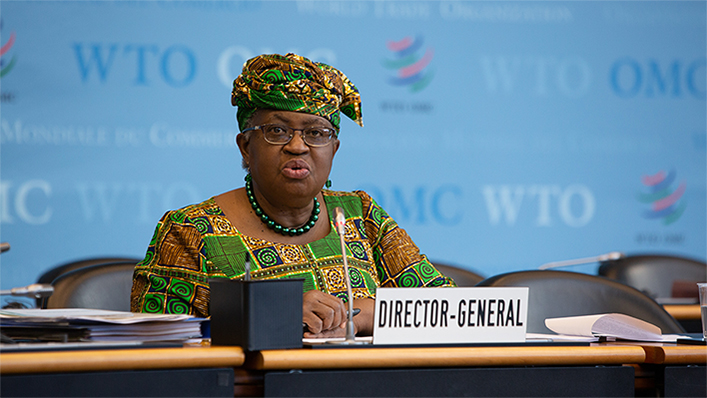The World Trade Organization alongside the International Finance Corporation has unveiled a N1.9 billion ($1.2m) Standard Trade Facility (STDF) targeted at boosting Nigeria’s export capacity and reducing incidences of export rejects in Europe and Asia.
In her keynote address, the Director General of the WTO, Dr. Ngozi Okonjo Iweala revealed that the facility is targeted at two major crops, Sesame and cowpea, adding that Nigeria is the world’s largest producer and consumer of cowpeas.
Her words: “Sesame is primarily an export crop, and Nigeria is the world’s fourth leading producer, exporting to the EU, Türkiye, Japan, South Korea and other Asian markets. However, Nigerian cowpea and sesame exports have increasingly faced rejections in several destination markets due to non-compliance with international SPS requirements.
To tackle these problems this new project aims to build the capacities of stakeholders across the sesame and cowpeas value chains to better understand market access requirements, to improve agricultural practices such as pesticide application, hygiene techniques, harvest and post-harvest methods, and food safety.
- African Games: Nigeria secures 2nd position with 6 more gold medals
- 45-year-old farmer raped, macheted to death in Ondo
“The project which will kick off with an initial amount of $1.2 million which will also be used to train local food safety advisers,” she said.
Also speaking, the Minister of Industry Trade and Investment, Doris Uzoka-Anite said the ministry has commenced the disbursement of about N50 billion Presidential Conditional Grant Scheme (PCGS) through the Bank of Industry, targeting various economic players, adding that the federal government has also signed an Enhanced Trade and Investment Partnership (ETIP) MOU with the United Kingdom.
Earlier in her remarks, the Executive Director of the Nigerian Export Promotion Council (NEPC) said available facts reveal that Nigerian food exports including sesame and cowpea have often faced rejects due largely to poor quality, inefficient procedures and documentation, Sanitary and Phyto-sanitary issues and improper packaging and labelling among others.
She however noted that a good number of these factors led to the decision of WTO/ITC to sponsor the STDF project, which will be backed by expected 30% counterpart funding from NEPC while noting that the project, STDF 845, will therefore enhance the quality and standard of sesame and cowpea through the institution of good Sanitary and Phyto-sanitary (SPS) conducts, Good Agricultural and Warehousing Practices (GAWP), packaging/labelling and excellent storage systems.
All these are expected to forestall frequent contract cancellations and loss of business opportunities, while allowing significant increase of global acceptance of the items and for better quality of these products consumed locally.
“We hereby encourage and are targeting the major producing states like Benue, Nassarawa, Jigawa, Yobe, Gombe and Kano among others, to scale up production in order to capture more market share of the major off takers of these produce in the global market like Japan, China, India, the Netherlands and others,” she further stated

 Join Daily Trust WhatsApp Community For Quick Access To News and Happenings Around You.
Join Daily Trust WhatsApp Community For Quick Access To News and Happenings Around You.


